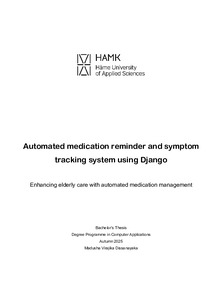Automated medication reminder and symptom tracking system using Django : enhancing elderly care with automated medication management
Dissanayaka, Madusha Virajika (2025)
Dissanayaka, Madusha Virajika
2025
All rights reserved. This publication is copyrighted. You may download, display and print it for Your own personal use. Commercial use is prohibited.
Julkaisun pysyvä osoite on
https://urn.fi/URN:NBN:fi:amk-2025112529650
https://urn.fi/URN:NBN:fi:amk-2025112529650
Tiivistelmä
This thesis aimed to create an automated web-based system to help caregivers keep track of patients' medication and symptoms at nursing homes. This idea came from problems at the practice TurvaHoiva Oy nursing home in Finland. The company now keeps track of medications and records residents' medical information on paper. This manual process makes it more likely that people will miss doses or report wrong information, which can be very dangerous for patients. Hence, the project aimed to provide a simple web-based solution using Django, React, and SendGrid to keep track of medication schedules and patient symptoms accurately.
The thesis applied iterative development during the process. The process includes planning, doing, testing, and judging. As well as used Django REST Framework for the back end and React for the front end. The system used JWT authentication to ensure that the data remains secure. APScheduler and SendGrid were used to send emails reminding people to take their medicine. The system used simulated data to evaluate it, ensure it functioned properly, was dependable, and maintained data security.
The results indicate that the chosen technologies can safely keep health data and send reminders to take medicine. This experiment demonstrated how Django, React, APScheduler, and SendGrid can work together. Configuring SPF, DKIM, and DMARC authentication for the sending domain could be beneficial for users sending emails through Outlook. The technology autonomously performed tasks, ensured data security, and was user-friendly. A mobile version that sends push notifications could serve as an alternative to email reminders. It is important to test how usable the system is with caregivers for improvements in workflow. Furthermore, offering the system in multiple languages would allow more individuals and caregivers to use it more smoothly.
The thesis applied iterative development during the process. The process includes planning, doing, testing, and judging. As well as used Django REST Framework for the back end and React for the front end. The system used JWT authentication to ensure that the data remains secure. APScheduler and SendGrid were used to send emails reminding people to take their medicine. The system used simulated data to evaluate it, ensure it functioned properly, was dependable, and maintained data security.
The results indicate that the chosen technologies can safely keep health data and send reminders to take medicine. This experiment demonstrated how Django, React, APScheduler, and SendGrid can work together. Configuring SPF, DKIM, and DMARC authentication for the sending domain could be beneficial for users sending emails through Outlook. The technology autonomously performed tasks, ensured data security, and was user-friendly. A mobile version that sends push notifications could serve as an alternative to email reminders. It is important to test how usable the system is with caregivers for improvements in workflow. Furthermore, offering the system in multiple languages would allow more individuals and caregivers to use it more smoothly.
